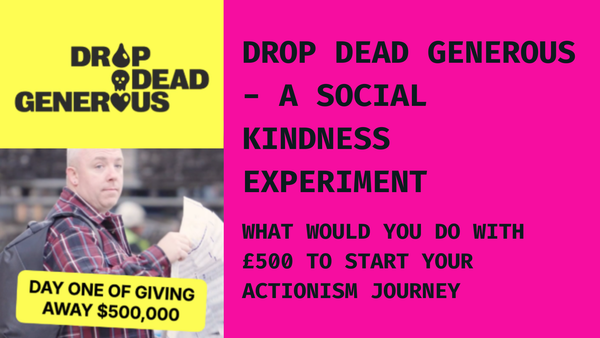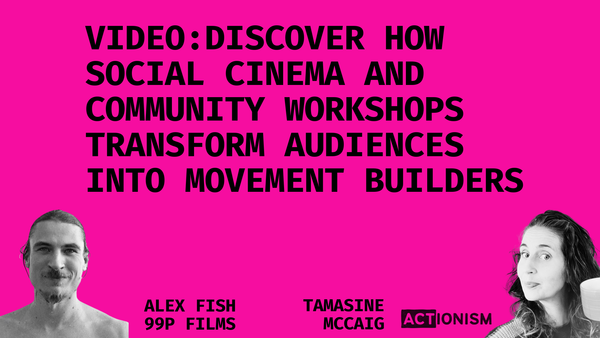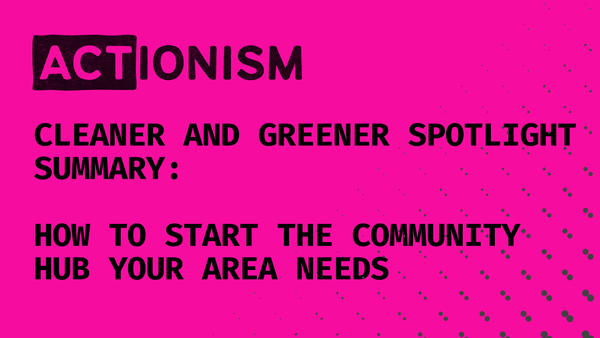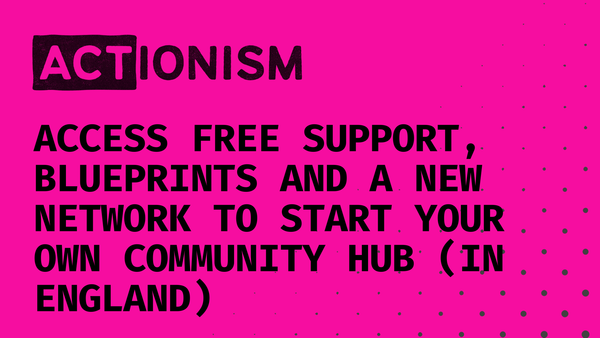ACTionism Contributor Guidelines
Thanks for expressing an interest in contributing to ACTionism. Here are our guidelines for anyone wanting to submit content for our movement.
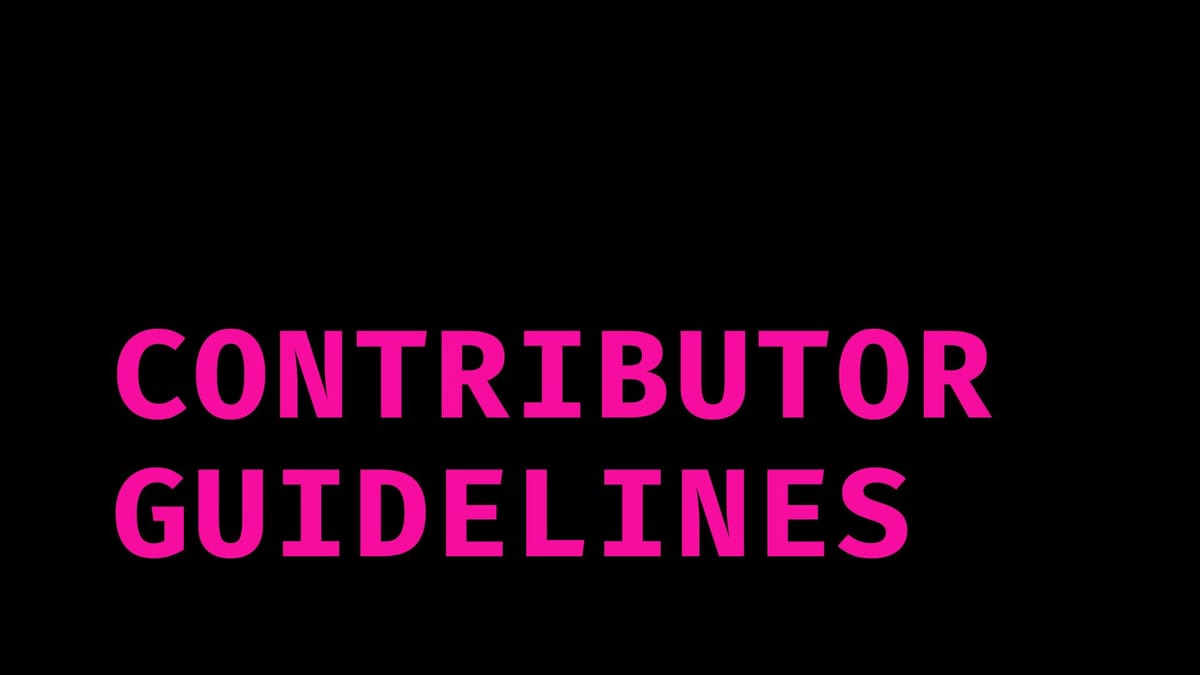
Thanks for expressing an interest in contributing to the ACTionism.space.
You know that feeling when you look around and see what needs changing, but wonder if you're alone in caring? You're not. And you have more power than you think.
ACTionism is the art of finding your people and taking action - together.
Inspired by Jon Alexander's insight in his book CITIZENS, that "all of us are smarter than any of us," we reject the tired narrative that you're either a passive subject or an isolated consumer. What you are instead, is an active citizen capable of creating meaningful change - from regenerating local ecosystems to transforming education, healthcare, transport, and community spaces.
News cycles sharing doom and gloom are causing paralysis - a feeling that we cannot effect change on the scale required. So we have set up ACTionism.space to inspire others by sharing examples of ordinary people bucking the system to effect change. We also help people find their tribe so they can start taking collective action.
We're building a joyful movement of everyday citizens stepping into their agency to create positive change in their communities, spaces, and challenges.
Our Mission
We believe in the power of collective action to transform our world. Whilst we acknowledge systems need changing, our focus is on empowering others to take action rather than dwelling on what's broken. We're apolitical but deeply committed to strengthening democratic participation and community engagement.
ACTionism works to:
- Lift up marginalised voices and ensure our work reflects community diversity.
- Cultivate joy deliberately - it creates energy, energy creates movement, and movement changes communities and systems
- Amplify the work of community initiatives and organisations that align with our manifesto
- Educate by sharing stories, strategies, and practical guidance for collective action
- Build collective agency and reduce feelings of powerlessness
- Promote and enable community-led solutions across food, education, nature, repair, and local spaces
- Help people turn inspiration into practical action in their communities
- Celebrate and amplify grassroots initiatives that demonstrate collective power
- Connect people through accessible storytelling and community places and spaces
What kind of articles are we looking for?
Inspiring AND Actionable = Perfect ACTionism Content
Every piece should leave readers thinking: "I can do this too!" Whether you're sharing a personal journey, offering practical guidance, or spotlighting brilliant initiatives, end with clear steps readers can take.
Where will your writing / content be shared?
Initially we are sharing content on www.actionism.space but also have an Instagram channel, and are working on the next edition of our magazine. We also have plans for a podcast/audio workshop series. At present we are looking for relevant contributions for the website and newsletter. But may also ask if you would like to be featured on our other platforms.
Payment & Expenses
We're currently an unfunded grassroots movement, which means we can't offer payment for articles. However, if you need to incur reasonable expenses whilst creating your piece (travel for interviews, event tickets) please discuss this with us beforehand. We'll do our best to cover necessary costs that help you create brilliant content for our community.
Content Categories
We've identified key themes that spark both inspiration and action. Choose one of these topic areas for your contribution:
- Food - Examples might include: Community gardens, food justice, local food systems, community dining
- Learning/Education - Examples might include: Skill-sharing, community education, informal learning networks, new democratic systems for parents and children
- Repair/Reuse - Fix-it cafes, repair culture, sustainability through mending
- Community Hubs - Creating and activating spaces for connection and action in local places and spaces
- Energy and Power - Community energy, local power generation, energy democracy
- Health and Wellbeing - Community health initiatives, mental health support, wellbeing networks -e.g Andy’s Mens club
- Transport - Sustainable transport, community mobility solutions, active travel
Content Types
- Guides - Step-by-step how-tos (e.g., "How to Start a Repair Cafe in your town")
- Spotlights - Celebrating people and projects creating change - these are led and created by the ACTionism team, but you are welcome to suggest people/organisations for us to feature.
- Reflections - Personal journeys and lessons learned (always ending with actionable next steps)
- Events - Listings of inspiring gatherings, conferences, or community actions that focus on the idea of ACTionism
Writing Guidelines
Tone & Style
- Joyful and welcoming - we want the content to exude joy and inspiration
- Encouraging - Focus on possibility, not just problems
- Practical - Give people concrete steps they can take, as well as where they can find out more or who they can talk to for help
- Inclusive - Welcome all backgrounds and experience levels, and where possible lift up under-represented and marginalised voices and initiatives.
Structure Tips
- Use clear headings to break up your content
- Include bullet points for easy scanning
- Add bold text for key takeaways
- Embed YouTube videos or link to relevant resources
- Always include an " ACT/What You Can Do Now" section
The ACT Principle
Every article should end with ACT - specific actions readers can take:
- Access - What resources or connections do they need?
- Connect - How can they find others doing similar work?
- Take action - What's the first step they can take this week?
Geographic focus
Whilst we're UK-focused, we celebrate ACTionist initiatives worldwide. Share your local initiatives, but help readers understand how they might adapt your approach to their own context.
Technical requirements
Submission Process
- Express interest - Email us hello@actionsim.space with your idea and if we’re interested we’ll get back in touch - we’re volunteer led atm so please bear with us.
- Get set up - We'll create your Ghost profile for easy drafting
- Write and save - Draft your piece directly in Ghost
- Review process - We'll edit collaboratively and schedule publication
- Celebrate - Share your published piece with your networks and drive new ACTionists to our site and newsletter.
Online Optimisation
- Length - Write as much as needed to be helpful (typically 500-1500 words)
- Headers - Use H2 and H3 headings for easy navigation
- Links - Include relevant external resources and YouTube embeds
- Images - Add photos that bring your story to life (ensure you have permission and please note we may edit these to include ACTionism styling before we publish)
Content we love
- Personal stories of stepping into agency
- Practical guides that others can replicate
- Spotlights on unsung community heroes
- Reflections on lessons learned (with actionable insights)
- Documentation of successful community initiatives with actionable insights
- Creative approaches to common challenges that others can replicate
What we're not looking for
- Purely academic pieces without practical application
- Complaint-focused content without solutions
- Partisan political content
- Content that doesn't empower readers to act
- Anything that discourages or overwhelms rather than inspires
Questions?
Ready to contribute? Have questions about your idea? We're here to help you craft something brilliant that inspires others to step into their own agency.
Background
How ACTionism came to exist
The term ACTionism was initially coined by filmmaker Michael Shaw, as a working title for a film created in collaboration with the Re-Action Collective, founded by Gavin Fernie-Jones and Heather Davies.
Through hosting a number of community film screenings and discussions, it became clear the idea of ACTionism was resonating with people. It also ties in closely with the work of the Citizens Collective - an experiment led by Jon Alexander, Tamasine McCaig and Olivia Stamp to spread the idea of ‘active citizening’. A merging of minds occurred and the ACTionism project was born.
Our TeamThe core team (for now) comprises Gavin and Heather and Tamasine McCaig

